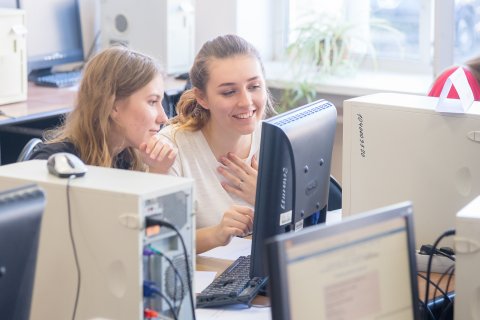Specialists in computer simulation have been in demand since the first computers appeared in the middle of the last century, and now, in the era of the rapid development of supercomputers, they are in demand more than ever. At present, simulation experiments are successfully replacing many expensive full-scale experiments.
What is a simulation experiment? It includes the development of a mathematical model, which is a system of equations describing a specific physical process; a computational algorithm, on the basis of which a software package is written; and the processing of the obtained results. In modern physical experiments, substances or materials are subjected to superstrong influences, in which direct measurement of physical characteristics is difficult or even impossible, therefore, the development of a mathematical model that adequately describes physical processes is a complex and urgent problem. The software packages created on the basis of these models make it possible to solve such problems as: air flow around aircraft bodies, modelling flows in complex pipeline systems with high pressure, calculating the flame front during forest fires and detonation waves during blasting operations, and protecting ground objects from impact of shock waves of man-made and natural origin.
The Department of Computational Mechanics trains specialists of this kind. What is the uniqueness of the major 01.03.03 Mechanics and Mathematical Modelling? It combines fundamental training in the disciplines of physico-mathematical and computer cycles. Students gain in-depth knowledge of mathematics, mechanics and programming. To solve specific problems, applied programs (ANSYS, OpenFOAM) are used. Students create their own algorithms and software complexes in the C ++ / C # languages and in the MATLAB package. From junior years, students are involved in research work, participate in all-Russian and international conferences, and publish articles. All conditions have been created for this at the department. First, there is a Mathematical Modelling of Aero- and Hydromechanics Research Laboratory. Secondly, project-based learning is implemented here. Scientific supervision is provided by Yurii Kovalev, Doctor of Sciences (Physics and Mathematics), Professor, member of the Russian National Committee for Theoretical and Applied Mechanics. The key industrial partner of the department in the implementation of scientific research and project-based learning is the Russian Federal Nuclear Centre – VNIITF (Zababakhin All-Russian Scientific Research Institute of Technical Physics).
Students who have completed a Bachelor's degree in this field continue their studies in Master's degree programmes at SUSU, and successfully enrol in Master's degree programmes at Lomonosov Moscow State University and St. Petersburg University. In the future, they find jobs at enterprises of the state corporations, such as Rosatom, Roskosmos, as well as enterprises of the oil and gas industry.
.png)
"I entered the Faculty of Mathematics, Mechanics, and Computer Science because I tended towards studying mathematics and physics from my school years. It was because of the latter that I chose such major as Mechanics and Mathematical Modelling at the Department of Computational Mechanics. During my third year of studies, I realized that I got what I expected. The department carries out scientific work with involvement of students. For example, I worked on the development of equations of the of state of explosives. In fact, it's interesting and fascinating. Great knowledge and invaluable experience in computing and data processing allowed me to easily enrol in my Master's degree programme at St. Petersburg University and continue my scientific activities in the P.L. Chebyshev Research Laboratory, where, within the framework of cooperation with PAO GazpromNeft, the laboratory staff are conducting research on the project entitled Examination and Identification of New Approaches and Methods Characterizing Reservoir Performance: Displacement of Viscous Incompressible Fluids, Description and Modelling of Crosshole Space," (from an interview with the 2019 graduate Konstantin Kalinin)
The opinion of the head of the laboratory of the Russian Federal Nuclear Centre – VNIITF (Zababakhin All-Russian Scientific Research Institute of Technical Physics) Inga Makeeva about our graduates is the following:
.png)
"Russian Federal Nuclear Centre – VNIITF deals with the urgent problems of computational and experimental study of the behaviour of substances and materials under dynamic and static loads. Accordingly, specialists in continuum mechanics, properties of substances and computer modelling of complex physical and chemical processes are in great demand. Graduates majoring in Mechanics and Mathematical Modelling have such competencies and are in demand in our company. Moreover, we take an active part in the training of these specialists."
Russian Federal Nuclear Centre – VNIITF (Zababakhin All-Russian Scientific Research Institute of Technical Physics) is an opportunity to apply your competencies, knowledge and fulfil your potential in scientific research and technology.




